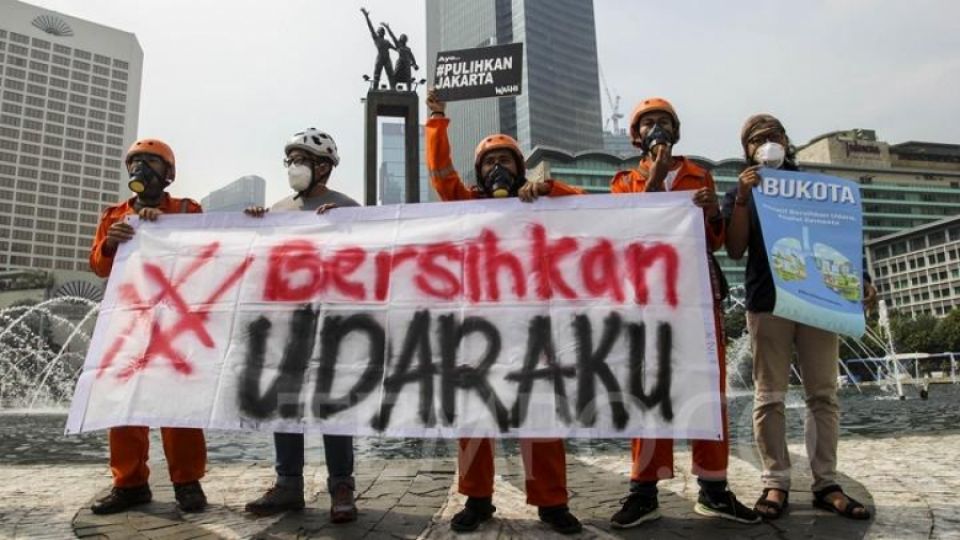The President of the Republic of Indonesia, the Ministers of Environment and Forestry, Home Affairs, and Health, as well as the Governor of Jakarta, are sentenced to make and improve Jakarta's air quality policies, including those originating from transboundary pollution. After being postponed for the eighth time, this is the long-awaited verdict for the Citizens' Lawsuit from 32 plaintiffs regarding the air pollution in the Indonesian capital city, DKI Jakarta, announced by the Central Jakarta District Court on Thursday, September 16, 2021.
The judges partially granted the lawsuit (1) and declared that the President of Indonesia, the Ministers of Environment and Forestry, Home Affairs, and Health, as well as the Governor of DKI Jakarta, had committed acts against the law. The sentences handed down to the defendants, which contain requests for policy formulation and improvement regarding air pollution, must be implemented and planned swiftly. Although the judges did not admit the negligence of maintaining the air quality of Jakarta as a violation of human rights, they did state that the defendants must fulfill the right to a healthy environment for all Jakarta residents by reducing air pollution in Jakarta and tackling it properly.
“Healthy air is one of the basic human rights. We hope that the Indonesian government will do their jobs as ordered by the court, deliver their duty to prevent toxic exposures to its citizens, and uphold the right to healthy air. The inventory of pollution sources and monitoring of air quality is the backbone of clean air regulation,” said Yuyun Ismawati, Senior Advisor of the Nexus3 Foundation(2) and one of the plaintiffs. “Such a helping program could be Pollutant Release and Transfer Register (PRTR) which has been successfully implemented in European Union countries, U.S.A or Japan to control and evaluate the overall emissions released by industrial operations.”
One of the basic programs that must be implemented is a sustainable and transparent inventory of sources of pollution, both stationary and non-stationary, in Jakarta and the surrounding administrative areas. “The core principle of PRTR is synchronization and transparency, which could provide a strong base for further policy in the long term. It would be useful for all stakeholders, including the government, the general public, and the industry,” adds Jindrich Petrlik, head of Arnika's Toxics and Waste Program(3).

Notes:
1) Points from the verdict of the Central Jakarta District Court:
- Granted some of the claims of the defendants
- To declare that the President of the Republic of Indonesia, the Minister of Environment and Forestry, the Minister of Health, the Minister of Home Affairs, and the Governor of DKI Jakarta have committed acts against the law
- Punish the President of the Republic of Indonesia to tighten the national ambient air quality standards enough to protect human health, the environment, and ecosystems including sensitive pollution health based on the development of science and technology
- Sentencing the Minister of Environment and Forestry to supervise the Governor of DKI, Governor of Banten, and Governor of West Java in tightening cross-border emissions for the Provinces of DKI Jakarta, Banten, and West Java.
- Punish the Minister of Health to supervise and foster the performance of the Governor of DKI Jakarta in controlling air pollution
- To punish the Minister of Home Affairs to calculate the reduction in health impacts due to air pollution in DKI Jakarta Province which needs to be achieved as a basis for consideration by the Governor of DKI Jakarta in formulating a strategy for air pollution control action plans.
- To punish the Governor of DKI Jakarta to: (a) supervise everyone's compliance with every provision of laws and regulations in the field of air pollution control and or provisions of environmental documents (b) impose sanctions on anyone who violates the laws and regulations on air pollution control (c) disseminate information on supervision and imposition of sanctions related to air pollution control to the public (d) tighten regional ambient air quality standards for DKI Jakarta province which are sufficient to protect human health, the environment and ecosystems, including the health of sensitive populations based on developments in science and technology.
- Punishing the Governor of DKI Jakarta to: (a) conducting an inventory of ambient air quality standards, potential for air pollution, meteorological and geographical conditions as well as field use by considering the distribution of emissions from pollutant sources involving public participation (b) determine the status of ambient air quality every year and announce it to the public (c) develop and implement strategies and action plans for controlling air pollution, taking into account the distribution of emissions from pollutant sources in a focused, targeted manner and involving public participation.
2) Nexus3 Foundation Nexus Foundation for Health, Environment and Development works with all stakeholders to promote the protection of people, especially vulnerable populations, from the impacts of development on their health and the environment, and works towards a just, toxic-free and sustainable future.
3) Arnika Association, Czech Republic non-governmental organization, focused on nature conservation, management of toxics and waste, and public participation in decision-making on environmental issues. The organization works with partners around the world to provide a better and healthier future for as many people as possible, regardless of geographic location.







